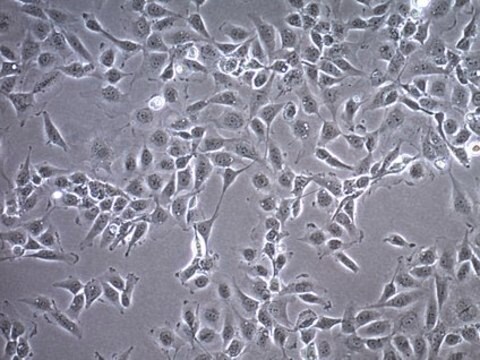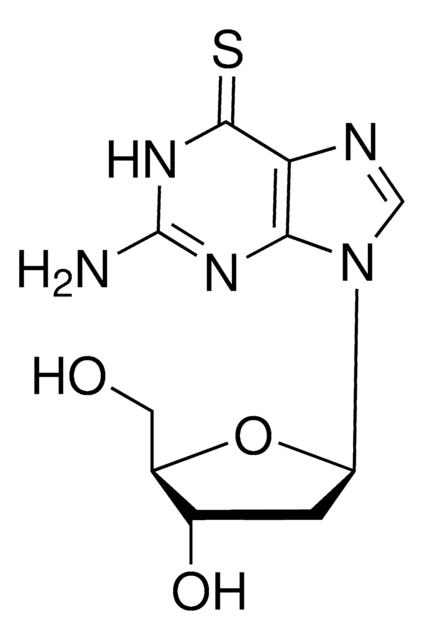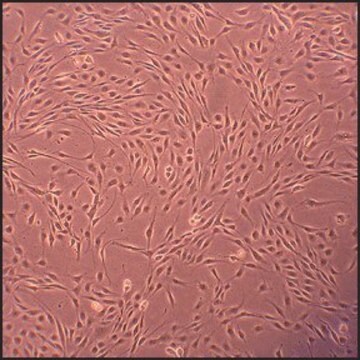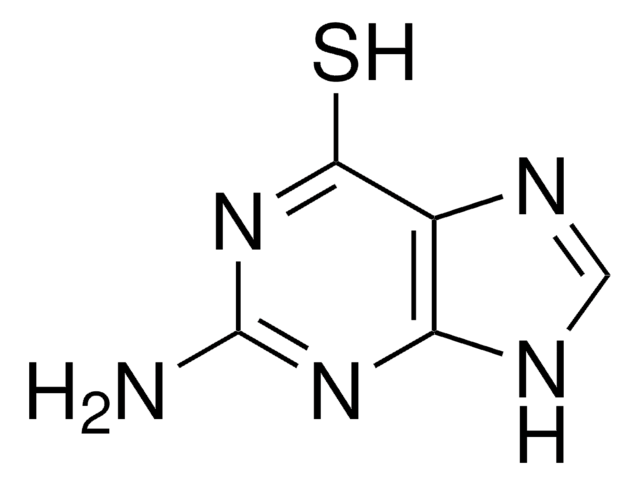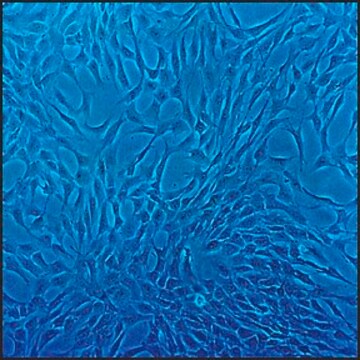CN402-05
Canine Chondrocytes: CnC (Cryovial)
Faça loginpara ver os preços organizacionais e de contrato
About This Item
Código UNSPSC:
41106514
NACRES:
NA.81
Produtos recomendados
fonte biológica
canine articular cartilage (normal)
embalagem
pkg of 500,000 cells
fabricante/nome comercial
Cell Applications, Inc
modo de crescimento
Adherent
cariótipo
2n = 78
morfologia
chondrocyte
técnica(s)
cell culture | mammalian: suitable
doença(s) relevante(s)
arthritis
Condições de expedição
dry ice
temperatura de armazenamento
−196°C
Descrição geral
Lot specific orders are not able to be placed through the web. Contact your local sales rep for more details.
Canine Chondrocytes (CnC) are derived from normal canine articular cartilage where they produce and maintain the extracellular matrix of cartilage. Following monolayer culturing, CnC can be grown in alginate microspheres to study chondrocyte proliferation and metabolism in a three-dimensional in vitro system. Alginate microspheres provide more physiological conditions for the chondrocytes and allow them to sustain normal proteoglycans production and retention. Because of the prevalence of degenerative joint disease in geriatric dogs, CnC can be a useful tool for veterinary practice.
Canine Chondrocytes (CnC) were utilized to evaluate anti-inflammatory and anti-oxidant activity of Glyco-Flex III (Yáñez, 2008) and trans-pterostilbene (Remsberg, 2008). They were also used in material studies aimed to develop optimal surfaces/scaffolds for engineered tissues, cellular arrays, biosensors and lab-on-chip devices (Wright, 2012; Shaik 2013a,b).
Canine Chondrocytes (CnC) are derived from normal canine articular cartilage where they produce and maintain the extracellular matrix of cartilage. Following monolayer culturing, CnC can be grown in alginate microspheres to study chondrocyte proliferation and metabolism in a three-dimensional in vitro system. Alginate microspheres provide more physiological conditions for the chondrocytes and allow them to sustain normal proteoglycans production and retention. Because of the prevalence of degenerative joint disease in geriatric dogs, CnC can be a useful tool for veterinary practice.
Canine Chondrocytes (CnC) were utilized to evaluate anti-inflammatory and anti-oxidant activity of Glyco-Flex III (Yáñez, 2008) and trans-pterostilbene (Remsberg, 2008). They were also used in material studies aimed to develop optimal surfaces/scaffolds for engineered tissues, cellular arrays, biosensors and lab-on-chip devices (Wright, 2012; Shaik 2013a,b).
Origem de linhagem celular
Cartilage
Aplicação
production and maintenance of extracellular matrix, cartilage, collagen, differentiation and de-differentiation, signal transduction, apoptosis, differentiation, drug screening, gene expression, cytokine production, agarose assays, chondrocyte adhesion to medical implants, scaffolds for cartilage regeneration
Componentes
Canine Chondryocyte Basal Medium containing 10% FBS & 10% DMSO
Nota de preparo
- 1st passage, >500,000 cells in Canine Chondryocyte Basal Medium containing 10% FBS & 10% DMSO
- Can be cultured at least 10 doublings
Rotina de subcultura
Please refer to the CnC Culture Protocol.
Código de classe de armazenamento
11 - Combustible Solids
Classe de risco de água (WGK)
WGK 3
Ponto de fulgor (°F)
Not applicable
Ponto de fulgor (°C)
Not applicable
Escolha uma das versões mais recentes:
Certificados de análise (COA)
Lot/Batch Number
It looks like we've run into a problem, but you can still download Certificates of Analysis from our Documentos section.
Se precisar de ajuda, entre em contato Atendimento ao cliente
Já possui este produto?
Encontre a documentação dos produtos que você adquiriu recentemente na biblioteca de documentos.
Nossa equipe de cientistas tem experiência em todas as áreas de pesquisa, incluindo Life Sciences, ciência de materiais, síntese química, cromatografia, química analítica e muitas outras.
Entre em contato com a assistência técnica

